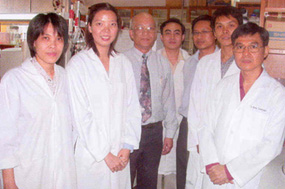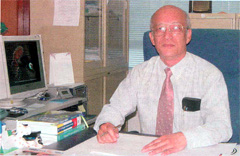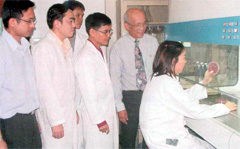|
Achievements
of Professor Dr. Vithaya Meevootison
Scientific
Research
Professor
Dr. Vithaya Meevootisom has been
continuously working on production
of antibiotics and related products.
Early in his research career, he collected
soil samples for isolation of microbes
capable of producing antibiotics.
From these microbes, he and his group
selected those with interesting patterns
of microbial inhibition and further
identified the antibiotics produced.
From this work, a few chemically new
antibiotics were found. Later, he
started working on enzymes involved
in the production of semisynthetic
beta-lactam antibiotics, because he
realized that enzymatic processes
for producing fine chemicals would
soon be widely accepted and would
replace existing chemical processes.
He focused first on enzymatic processes
for the production of important chemical
nuclei of antibiotics in the penicillin
group, including 6-aminopenicillanic
acid (6-APA), 7-aminocephalosporanic
acid (7-ACA) and 7-aminodesacetoxycephalosporanic
acid (7-ADCA). He also studied enzymatic
processes for the production of side
chain compunds for these nuciei, including
D-phenyglycine and D-p-hydroxyphenyglycine.
By applying new technology on genetic
engineering and protein engineering,
he and his group successfully improved
the yield of the penicillin acylase
enzyme and modified it for effective
immobillzation on solid supports.
His group was the first to clone penicillin
acylase fromBacillus megaterium.
To make the production of 6-APA possible
in Thailand, he and his group developed
a new process for enzymatically transforming
the cheap by-product, phenylacetic
acid, into the more expensive and
necessary side chain compounds, D-phenylglycine
and D-p-phydroxyphenylglycine. In
the search for new enzymes that could
be applied to this process, Dr. Vithaya
and his student, Assistant
Professor Dr. Suthep Wiyakrutta,
discovered a very interesting enzyme.
It mediated a previously undescribed
and very novel type of aminotransferase
reaction, where the stereo configurations
of the amino acids on the left and
right sides of the reaction were opposite
and not the same, as previously known.
Thus, the new enzyme was a stereo-inverting
D-phenylglycine aminotransferase.
Study of this enzyme continues in
order to understand the mechanism
of the stereo-inverting reaction it
performs and to fully utilize it in
the production of side chains compounds
for penicillin drugs and in other
applications such as quantitative
determination of L-glutamic acid in
food samples and biological products.

Another major research work of
Professor Dr. Vithaya Meevootisom
has been on the
use of microbes for improved production
of economic animals. In
the early days, he and Professor
Tim Flegel worked on a project
funded by IDRC on protein enrichment
of agricultural waste by fungi for
use as animal feed. Later, as Thailand
is one of the world's major meat exporters,
Dr. Vithaya realized that the public
pressure for prohibiting the use of
antibiotics as growth stimulants in
animal feed would steadily increase.
To fill the demand that would be created
in animal health care by their absence,
he pioneered research on the use of
natural microbes called probiotics
as a replacement for antibiotics in
stimulating animal health and growth
animals. Perhaps this work was before
its time, because acceptance by the
animal feed industry was not encouraging
due to many variable factors, including
the preference of most producers at
that time. This was probably due to
the lack of strong market pressure
against the practice. Today, however,
the situation is rapidly changing.
At present, many countries prohibit
the import of meat form farms that
rear animals with antibiotics as growth
stimulants. As a result, many animal
producers in Thailand are now asking
about probiotics. The experience of
their earlier work, results from their
present activities on probiotics and
results from other research institutions
will see a much more raid implementation
of this technology in Thailand than
would have been possible without this
background work. As an offshoot of
this work, Dr. Vithaya and his group
are currently searching for suitable
enzymes for use in animal feeds and
particularly on the isolation of enzymes
from unculturable microoganisms. This
is a very large, relatively untapped
resource that constitutes an estimated
99% of the total microoganisms present
in our natural environment. Dr. Vithaya
and his group will use the new technique
of metagenomics to search for enzymes
suitable for use in animal feeds and
other applications.
Academic 
Professor Dr. Vithaya Meevootisom
has wide experience in teaching students
in microbiology for both medical and
industrial purposes to undergraduates
and postgraduates. He had also helped
in organizing microbiology and biotechnology
courses for several Thai universities.
His teaching responsibilties in the
medical field serve the needs of students
in human and veterinary medicine,
nursing, medical technology, radiology,
public health and biolgy and students
in industrial fields of biotechnology
and food technology. Besides teaching
at Mahidol University, he has been
invited to give lectures to undergraduate
students at other institutions including
Chulalongkorn, Thammasat, Ubolrachathani,
Rangsit and Assumption Universities.
At the postgraduate level, he has
taught microbiology to students in
microbiology, biotchnology, medical
technology, public health and clinical
pathology. Dr. Vithaya had also written
a chapter on medical mycology published
in a medical microbiology textbook.
Applications
of Scientific knowledge to lndustry 
Professor
Dr. Vithaya Meevootisom has wide
experiences in assisting the private
sector. This includes assistance in
quantitative determination of microbes
in products, analyses of the causes
or sources of contamination in production
processes and recommendations on methods
for elimination of contaminaion by
methods including the use of heat
and suitable chemicals. He has also
helped in testing the efficiencey
of biocides in eliminating microorganisms
and worked as a consultant to solve
production problems and to assist
in the training of staff training
on the theory and practice of industrial
microbiology and sterilization. For
example, he was instrumental in helping
one sterile surgical gloves company
achieve ISO 9001 certification, to
receive a CE mark and gain USFDA approval,
allowing their products to be exported
worldwide. He has assisted another
company to develop a microbial product
for local use in treatment of shrimp
ponds and waste water.
Acknowledgement
of Professor Dr. Vithaya Meevootisom
There are many people whom I would
like to thank for their contribution
towards the success of my work. These
include my good coworkers, collaborators
and students and the administrative
team at Mahidol University, both past
and present. I would specifically
like to express my sincere gratitude
to Professor Dr. Pornchai Matangkasombut
as my mentor and teacher and as a
steady supporter of my research work,
I would also like to express special
thanks to Professor Dr. Yodhathai
Thebtaranonth. Without his teaching
and assistance in all chemistry work,
our work could not have been very
successful. Another person that I
would like to thank is Profesor
Dr. Amaret Bhumiratana who helped
me at the beginning of my research
career and taught me how enjoyable
and rewarding research could be. I
am grateful to several granting agencies
for kindly financing our research
work. These include the National Research
Council of Thailand, STDB, BIOTEC,
TRF, GPO, Mahidol University, IDRC,
IFS, and TWAS. I would like to express
my sincere gratitude to those who
nominated me and to the Nomination
Committee for considering me as the
recipient of the award for the year
2004. I would also like to express
my special thanks to the Thailand
Toray Science Foundation and the group
of Toray Companies in Thailand for
providing this award to encourage
science and technology in Thailand.
Thanks also to the staff at NSTDA
who helped in preparing this article.
Finaly, I am deeply grateful to my
parents for raising me and teaching
me to be kind and responsible and
to my wife and my children for their
great moral support.
Science and Technology Awards
Thailand Toray Science Foundation.
2003
ISBN 974-229-566-2
|

